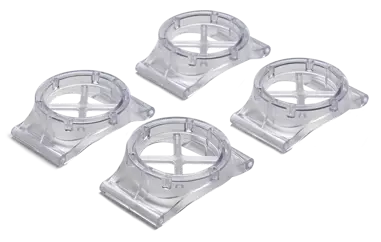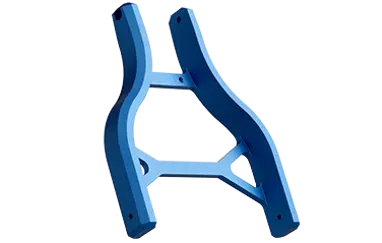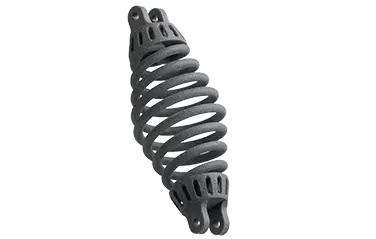Talk with Our Team
Hello! We just need a few bits of information then a manufacturing expert will reach out to you directly to see we how can partner on a future production project.
Thank you! We've received your request and a member of our team will reach out shortly.
Accelerating Production of Industrial Equipment and Components
Meet the growing need for connected hardware while still supporting legacy equipment and machinery with custom parts
Certification + Compliance
ISO 9001:2015 | ISO 13485:2016 | AS9100D | ITAR





How Do Industrial Equipment Companies Use Protolabs?
Supply Chain DiversificationBuild a manufacturing safety net into your supply chain that you can turn to during line-down situations or unplanned disruptions. |
On-Demand ProductionCreate agility in your supply chain by ordering quick-turn industrial components when needed. |
Jigs and FixturesStreamline part assembly and help reduce production costs with durable jigs and fixtures. |
Maintenance, Repair, and Operations (MRO)Order custom production parts on demand for MRO applications to keep equipment running without delay. |
Durable MaterialsChoose from more than 40 different metal alloys and hundreds of industrial-grade plastic and elastomeric materials, like silicone rubber and TPU for highly durable seals, gaskets, and other internal components. |
| We are the fastest and most comprehensive digital manufacturer in the industry with more than 25 years of experience developing products for innovative industrial companies around the world. | 100% of Fortune 100 Industrial Companies Served |
700 Million Parts Manufactured |
300,000 Customers Served |
Full Production Support Team
| We have a team of manufacturing experts working behind the scenes to fulfill your production order—we manage the entire process and keep you updated along the way. |

Account ManagerA dedicated account manager provides support, including assistance with platform and file uploads. |

Applications EngineersExpert CAD solutions and cost-reduction strategies tailored by in-house applications engineers to optimize your designs. |

Logistics |

Quality Control |
Manufacturing Services for Industrial Products
Injection Molding
Get affordable, high-quality molded parts and bridge tooling within days. With our free moldability consultation, the design and molding process is rapidly accelerated to save you time and money.
- Low-volume molding up to 100,000+ parts with volume pricing available—no MOQ required
- 100+ plastic, elastomeric, and silicone rubber materials
- Automated CMM for fast, in-house quality documentation
CNC Machining
Leverage the same speed, precision, and reliability in machining that you’re accustomed to at Protolabs but unlock advanced machining capabilities like tighter tolerances and volume pricing through our manufacturing network.
- Machined parts in as fast as 1 day with optional plating and anodizing in as fast as 4 days
- Cost-efficient machined parts at higher volumes
- Tolerances down to ±0.001 in. (0.020mm) through our digital network
3D Printing
Want quality parts and additive expertise at a single 3D printing source? Choose from seven different additive manufacturing technologies for cost-effective prototyping and highly precise, repeatable production parts.
- Additive technologies include metal 3D printing, SLA, SLS, FDM, and more
- 30 plastic and metal materials in a range of finishes
- 25 years of additive manufacturing expertise
Sheet Metal Fabrication
From easy quoting to quick-turn production and finishing options, get up to 500 quality sheet metal parts in your hands in days from a single supplier.
- Instant quotes with interactive manufacturability feedback
- Six sheet metal materials including aluminum, stainless steel, steel, brass, and copper
- Finishing options from welding and hardware insertion to powder coating and silk screening

Quality Measures for the Industrial Equipment Industry
Our industry-standard procedures and certifications guarantee quality and regulatory compliance.
| CMM inspection report | First Article Inspection (FAI) |
| Dimensional Inspection Report (DIR) | PPAP |
| Material Certificates + Certificate of Analysis | Conflict Minerals Reporting |
| REACH + RoHS Certificates | Prop65 |
| Industry Certifications: ISO 9001 and AS 9100 | Certificate of Conformance (CoC) |
| Industry Certifications (Protolabs Network): ISO 13485, ISO 14001, ISO 45001, and ISO TS16949 |
Materials for Industrial Applications

Steel and Stainless SteelIt’s strong, machinable, and relatively low in cost. Oil and gas fields, for example, often favor stainless steel for its corrosion resistance. Superalloys such as 3D-printed Inconel are an alternative for demanding applications. |

AluminumThough there is less concern with the component weight of industrial equipment and machinery, aluminum is often a metal of choice because of its excellent machinability and lower overall manufacturing cost. |

Thermosets and ThermoplasticsLiquid silicone rubber and other elastomers are widely used for applications requiring fuel-resistant parts while high-performance thermoplastics such as PEEK and PEI (Ultem) can serve as stand-ins for metal in some situations. |

Commodity PlasticsAs companies retrofit existing equipment with computer electronics to meet connectivity demands, a large range of versatile and affordable thermoplastics can be leveraged. |
Common Industrial Applications
We have several capabilities within our services and processes ideal for industrial equipment manufacturing. A few common applications include:
|
|

FOAM-iT Gets to Market in Record Time After Iterating on Their Flagship Product
FOAM-iT needed to update two of its flagship products quickly to make them less prone to damage in order to aid in the fight against COVID-19. By using our on-demand molding service, FOAM-iT took advantage of our design analysis and easy online ordering, along with a helping hand from in-house manufacturing experts to avoid delays.
Read More














